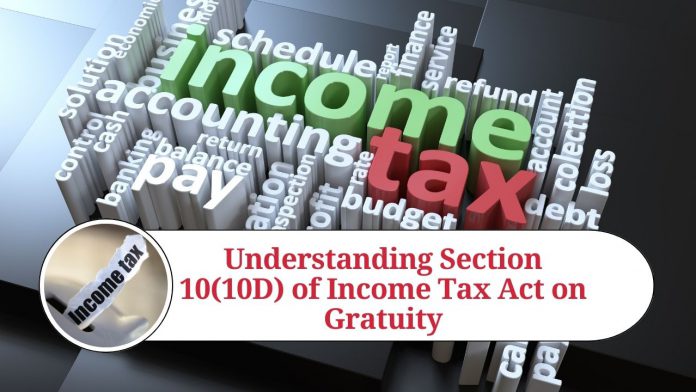Gratuity is an important retirement benefit provided by employers to their employees as a token of appreciation for their long-term service to the company. Gratuity is a sum of money paid by the employer to the employee when he/she retires or resigns after completing at least five years of continuous service in the organization.
The Income Tax Act, 1961, also provides certain tax exemptions for the gratuity received by employees. Section 10(10D) of the Income Tax Act, 1961, deals with the tax treatment of gratuity received by employees. In this article, we will discuss the various aspects of Section 10(10D) of the Income Tax Act, including its definition, applicability, and exemptions.
What is Section 10(10D) of Income Tax Act?
Section 10(10D) of the Income Tax Act, 1961, deals with the exemption of income from the payment of gratuity. This section provides that any amount of gratuity received by an employee from his/her employer at the time of retirement, death, or resignation is exempted from income tax up to a certain limit.
Applicability of Section 10(10D) of Income Tax Act
Section 10(10D) of the Income Tax Act applies to all employees who receive gratuity from their employers. However, to claim the tax exemption under this section, certain conditions need to be fulfilled.
Conditions for Tax Exemption under Section 10(10D) of Income Tax Act
The following conditions must be satisfied to claim tax exemption under Section 10(10D) of the Income Tax Act:
- The gratuity must be received by an employee at the time of retirement, death, or resignation.
- The gratuity must be paid by the employer or the employer’s agent to the employee or his/her nominee.
- The gratuity amount must not exceed the limit prescribed by the government.
- The employee must have completed at least five years of continuous service in the organization.
Exemptions under Section 10(10D) of Income Tax Act
Under Section 10(10D) of the Income Tax Act, the gratuity amount received by an employee is exempted from income tax up to a certain limit. The limit for gratuity exemption is revised from time to time by the government. Currently, the maximum limit for tax exemption on gratuity is Rs. 20 lakhs. Any gratuity amount received above this limit will be taxable.
Conclusion
Section 10(10D) of the Income Tax Act is a crucial provision for employees to claim tax exemption on the gratuity amount received from their employers. However, it is important to note that the exemption is subject to certain conditions, and the maximum limit for tax exemption on gratuity is also fixed by the government. Therefore, employees should be aware of these provisions to claim the maximum tax benefits on their gratuity amounts.
Read more useful content:
- section 145 of income tax act
- section 10e of income tax act
- section 9 of the income tax act
- section 94b of income tax act
- section 206aa of income tax act
Frequently Asked Questions (FAQs)
Q. What is Section 10(10D) of Income Tax Act?
Section 10(10D) of the Income Tax Act, 1961, is a provision that provides tax exemption for the gratuity amount received by an employee from his/her employer at the time of retirement, death, or resignation.
Q. Who is eligible to claim tax exemption under Section 10(10D) of Income Tax Act?
All employees who receive gratuity from their employers are eligible to claim tax exemption under Section 10(10D) of the Income Tax Act, subject to certain conditions.
Q. What are the conditions for tax exemption under Section 10(10D) of Income Tax Act?
The conditions for tax exemption under Section 10(10D) of the Income Tax Act are:
The gratuity must be received by an employee at the time of retirement, death, or resignation.
The gratuity must be paid by the employer or the employer’s agent to the employee or his/her nominee.
The gratuity amount must not exceed the limit prescribed by the government.
The employee must have completed at least five years of continuous service in the organization.
Q. What is the maximum limit for tax exemption on gratuity under Section 10(10D) of Income Tax Act?
The maximum limit for tax exemption on gratuity under Section 10(10D) of Income Tax Act is currently Rs. 20 lakhs. Any gratuity amount received above this limit will be taxable.
Q. Is the tax exemption under Section 10(10D) of Income Tax Act available for all types of gratuity?
Yes, the tax exemption under Section 10(10D) of Income Tax Act is available for all types of gratuity, including statutory gratuity, ex-gratia gratuity, and any other form of gratuity.
Q. Is there any tax liability if the gratuity amount exceeds the maximum limit of Rs. 20 lakhs?
Yes, if the gratuity amount received by an employee exceeds the maximum limit of Rs. 20 lakhs, the excess amount will be taxable as per the income tax laws.
Q. Is there any specific form or document required to claim tax exemption under Section 10(10D) of Income Tax Act?
No, there is no specific form or document required to claim tax exemption under Section 10(10D) of Income Tax Act. However, the employer is required to provide the employee with a Form 16 indicating the amount of gratuity paid and the tax deducted, if any.
Q. Can an employee claim tax exemption under Section 10(10D) of Income Tax Act if he/she has not completed five years of continuous service?
No, an employee is not eligible to claim tax exemption under Section 10(10D) of Income Tax Act if he/she has not completed five years of continuous service in the organization.




















